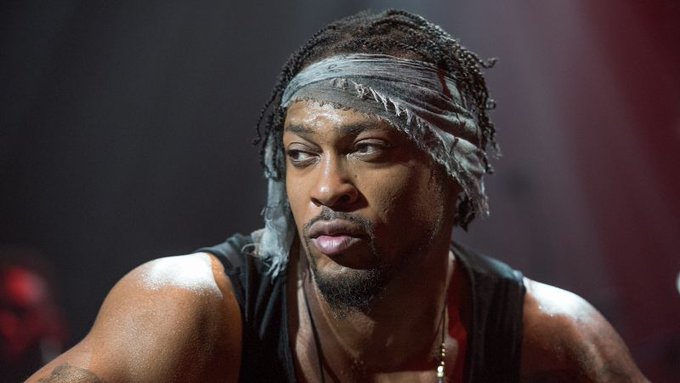D’Angelo, the Grammy Award-winning R&B singer who became a legend of neo-soul music, has died at 51

The world of music has lost one of its most enigmatic and influential figures. D’Angelo, the Grammy Award-winning R&B and neo-soul artist who reshaped the sound of an era, has died at the age of 51. His passing marks the end of a remarkable journey that began with raw talent, flourished into cultural revolution, and left behind a legacy that continues to define modern soul. Known for his deep voice, poetic lyrics, and intoxicating grooves, D’Angelo was never just a singer—he was a movement, a sound, and a spiritual force in contemporary music.
A Soulful Beginning
Born Michael Eugene Archer on February 11, 1974, in Richmond, Virginia, D’Angelo grew up surrounded by gospel and soul. His father was a Pentecostal minister, and church became the foundation for his earliest musical experiences. It was in that spiritual setting where his sense of rhythm, harmony, and emotion was nurtured.
As a child, he absorbed the sounds of Marvin Gaye, Prince, Stevie Wonder, and Al Green—artists who would later influence every aspect of his musical identity. He was a prodigious musician, learning piano by ear and experimenting with songwriting before his teenage years.
By the early 1990s, D’Angelo had already begun shaping his distinctive sound—a blend of vintage soul, funk, and modern R&B. His songwriting was introspective yet universal, sensual yet spiritual.
The Rise of a Neo-Soul Icon
D’Angelo’s debut album, Brown Sugar, released in 1995, was an instant revelation. At a time when R&B was dominated by glossy production and pop influences, Brown Sugar reintroduced organic instrumentation and emotional honesty. With tracks like “Lady,” “Cruisin’,” and the title song, the album defined what would soon be known as the neo-soul movement—a genre that bridged the classic warmth of 1970s soul with the cool confidence of 1990s hip-hop.
Critics hailed Brown Sugar as a masterpiece. It was seductive yet thoughtful, raw yet refined. The album earned D’Angelo multiple awards, including a Grammy nomination, and positioned him as the spiritual successor to Marvin Gaye and Prince. But while fame followed quickly, so did pressure.
The Weight of Genius
After Brown Sugar, D’Angelo disappeared from the spotlight for several years. Fans and critics wondered if the young prodigy had burned out. But behind the silence, D’Angelo was reinventing himself—both as a man and as an artist.
In 2000, he returned with Voodoo, an album that not only surpassed expectations but reshaped the very boundaries of R&B. The record was an audacious, deeply spiritual exploration of rhythm, vulnerability, and identity. Its grooves were loose yet deliberate, and its production—crafted alongside Questlove of The Roots—was revolutionary.
Voodoo won the Grammy Award for Best R&B Album, while its standout single “Untitled (How Does It Feel)” became both a cultural phenomenon and a double-edged sword. The song’s sensual video, featuring a nearly naked D’Angelo, made him a sex symbol—something he had never intended to be. The sudden shift in public perception, combined with the pressures of fame, drove him further into isolation.
The Lost Years
In the years following Voodoo, D’Angelo retreated from the public eye. He struggled with personal issues, including addiction and mental health challenges, and faced several legal troubles. For over a decade, he became a myth—a ghost of genius whose absence only deepened his legend.
Yet even in silence, his influence continued to ripple through the music world. Artists like Erykah Badu, Maxwell, Lauryn Hill, Alicia Keys, and Frank Ocean carried his torch, drawing inspiration from his fearless fusion of soul, funk, and vulnerability.
During these years, rumors of new music surfaced frequently but rarely materialized. His perfectionism and self-doubt made recording a grueling process. Still, fans waited, believing that when D’Angelo did return, it would be worth it.
The Triumphant Return
In December 2014, seemingly out of nowhere, D’Angelo released Black Messiah—his first album in 14 years. The timing was no accident. America was in the midst of social and racial unrest, and the album’s themes of revolution, identity, and love struck a powerful chord.
Black Messiah was raw, political, and unapologetically Black. Songs like “The Charade,” “1000 Deaths,” and “Really Love” confronted systemic injustice while celebrating the beauty of resilience. Critics hailed it as a modern classic. Rolling Stone called it “a masterwork of protest and passion,” and it earned D’Angelo yet another Grammy Award.
What made Black Messiah so extraordinary was not just its sound but its spirit. It wasn’t a comeback—it was a rebirth. D’Angelo had transformed his pain and silence into something transcendent.
The Essence of His Art
D’Angelo’s music was never about perfection—it was about presence. His grooves didn’t rely on precision but on feel. He used imperfection as an instrument, bending time and tone to evoke emotion in ways few artists could replicate.
Lyrically, he oscillated between sensuality and spirituality, often merging the two into a singular expression of human experience. His falsetto whispers and growling lows told stories of love, loss, and liberation. Every chord he struck carried a heartbeat; every lyric was a prayer.
He once described his creative process as “channeling the ancestors.” And in many ways, that’s exactly what he did—bridging the sacred and the secular, the earthly and the divine.
Beyond Music: The Man Himself
Those who knew D’Angelo personally often described him as soft-spoken, humble, and deeply introspective. Despite his fame, he shunned celebrity culture, preferring solitude and authenticity. His mystique was not cultivated for marketing—it was simply who he was.
He was also known for his quiet acts of generosity, supporting emerging musicians, funding community programs, and mentoring young artists behind the scenes. For him, music was never about fame; it was about connection.
In interviews, D’Angelo often spoke about his spiritual beliefs and his desire to stay true to the music rather than the industry. “If it doesn’t come from the soul,” he once said, “it doesn’t matter how good it sounds.”
The Final Chapter
News of D’Angelo’s death at 51 has sent shockwaves through the global music community. Tributes have poured in from fellow artists, including Questlove, Erykah Badu, and John Legend, all of whom credited him with shaping their artistic vision. Fans around the world are revisiting his albums, rediscovering the sound that defined a generation.
While the details surrounding his passing remain private, what is certain is that his spirit will continue to resonate in every note of modern R&B, hip-hop, and soul.
His life was one of brilliance and struggle, of art and exile, of silence and sound. D’Angelo’s journey mirrored the soul music he created—beautiful, imperfect, and deeply human.
Legacy of a Neo-Soul Pioneer
D’Angelo’s contribution to music cannot be overstated. He helped birth an entire movement—the neo-soul revolution—that challenged the commercial dominance of mainstream pop and brought authenticity back to Black music.
Through Brown Sugar, Voodoo, and Black Messiah, he created not just albums but entire worlds—each one reflecting a different era of his growth and the changing consciousness of his audience.
He inspired a new generation of artists to seek truth in sound and to embrace vulnerability as strength. In an age of digital perfection, D’Angelo reminded us that soul music is about feeling, not formula.
An Eternal Groove
Even in death, D’Angelo’s music lives on as an eternal groove that refuses to fade. His songs continue to soundtrack love stories, political movements, and moments of personal introspection. Every time his voice drifts through a speaker, it feels like a conversation with the divine.
He may be gone, but his art—his soul—remains forever imprinted on the world’s collective rhythm.
As the music world mourns, we are reminded that legends like D’Angelo never truly die. They simply fade into the melody, becoming part of the song that never ends.








